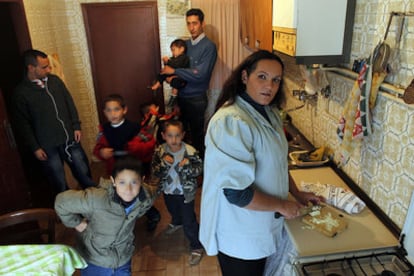"I didn't dare to ask the Church at first, but we have nowhere else to turn"
Two families explain how the crisis is forcing them to seek help from charities
Manuel fidgets nervously as he tells his story. Aged 60, this engineer with more than 40 years of experience in the construction sector is deeply embarrassed at the circumstances he now faces. He's been unemployed since May, and has been working for free for the last five months to repay the debts owed by the company he was a partner in. He has managed to hold onto his apartment, but has spent most of his life savings. He receives 660 euros unemployment benefit, which must cover his and his wife's living costs, along with those of his three unemployed children and their families.
Four months ago, as their situation reached critical, his wife Ascensión approached their local church - in the Madrid dormitory town of Leganés - which is already helping more than 50 families.
The Catholic Church's charitable organization Cáritas says that around 40 percent of the people that are coming to it for help are doing so for the first time.
Organizations such as Cáritas and the Red Cross say that there has been a twofold increase in the number of families in need of help over the last two years. Cáritas has some 800,000 people on its books, the Red Cross 910,000, and the Association of Food Banks around the same number. Some families are getting help from all three. The charities say that most people who come to them are in the same situation: they are long-term unemployed, their welfare payments are insufficient or have run out, and the state is failing to help them.
"A life spent working for this..." says Manuel, whose pride has taken a knock. "I didn't dare to ask the Church at first, but my family is the most important thing. We have nowhere else to turn."
The crisis has hit immigrants particularly hard. Despite making up only 10 percent of the population, they make up half of those facing destitution. Cáritas calculates that compared to 2007, 36 percent of the population has seen its economic situation worsen. "There are people who have been thrown into poverty, or whom are now very vulnerable," reads the charity's 2009 report, which also says that the situation will worsen, at least in the short term.
The Propín Pecos family, who live in Béjar, in Salamanca, have been hit even harder than Manuel and his dependents. The household now numbers seven: Rosa and Julio, both aged 30, four children, and Carlos, Rosa's brother. None of the three adults works. Julio receives 426 euros in welfare, while Rosa pulls in ¤36 for cleaning work. The rent on their crumbling, freezing apartment is 240 euros. Their heating, food and light bills come to 138euros a month, while the baby's disposable nappies cost 45 euros. Their clothes are donated by the local church, as is most of their food.
Julio and Rosa were just about getting by until two years ago. She had worked as a waitress, as well as in a supermarket. He had been in the army for five years, and now regrets leaving. Like so many other unskilled men, he ended up working in construction.
He says that he has never been in this situation before. "I was paid regularly. Now everything is dead. First it was the textile industry, then construction, then the restaurant trade, and now the meat industry is closing down. We've spent the last two years sliding deeper and deeper into poverty. I haven't slept properly in all that time." He says that he has even been reduced to begging from door to door, and that in January, his 426 euros benefit runs out. "If nothing turns up, I'll head to France to join the Foreign Legion."
Miguel Morón, a social worker at the Red Cross in the working-class district of Móstoles in the south of the city, says that September has been the worst month so far. "In 2008 we had 685 families on our books; that figure has now risen to 1,071. We have around 25 new families coming to us each month. The problems they face are always the same: their outgoings are far higher than their income."
Sebastián Mora, Cáritas' general secretary, says that the crisis is hitting increasingly hard. "It is proving to be a tough crisis, both in terms of the speed with which it has spread, as well as in terms of the number of people hit by it. The local authorities have been unable to deal with the number of people in need. The problem is that we cannot be the only line of defense - public money is needed to fight this. We are saying that the state has to step in to help the growing numbers of families in trouble."

Tu suscripción se está usando en otro dispositivo
¿Quieres añadir otro usuario a tu suscripción?
Si continúas leyendo en este dispositivo, no se podrá leer en el otro.
FlechaTu suscripción se está usando en otro dispositivo y solo puedes acceder a EL PAÍS desde un dispositivo a la vez.
Si quieres compartir tu cuenta, cambia tu suscripción a la modalidad Premium, así podrás añadir otro usuario. Cada uno accederá con su propia cuenta de email, lo que os permitirá personalizar vuestra experiencia en EL PAÍS.
¿Tienes una suscripción de empresa? Accede aquí para contratar más cuentas.
En el caso de no saber quién está usando tu cuenta, te recomendamos cambiar tu contraseña aquí.
Si decides continuar compartiendo tu cuenta, este mensaje se mostrará en tu dispositivo y en el de la otra persona que está usando tu cuenta de forma indefinida, afectando a tu experiencia de lectura. Puedes consultar aquí los términos y condiciones de la suscripción digital.








































